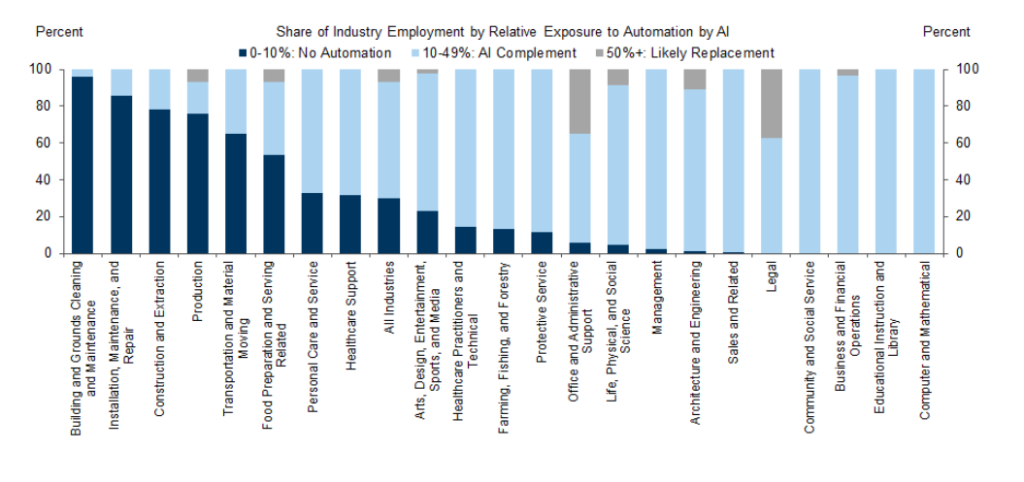The rise of AI automation is reshaping the way businesses operate, opening doors to opportunities that were once unimaginable. AI is no longer just a tool for automating repetitive tasks — it’s becoming a key driver of growth, creativity, and innovation. This transformation is particularly valuable for industries such as manufacturing, wholesale, fashion, retail, health and wellness, and professional services.
In this blog, we’ll explore how your business can benefit from AI automation and discuss practical ways to integrate it into your operations.
From automating routine tasks to optimising decision-making, AI is something that you, a business leader, can turn to if you want to drive efficiency and improve your overall performance.
Does AI Replace or Complement Human Work?
First, let’s dive deep into this labour study conducted by Goldman and Sachs. Generative AI can help generate content that does not just resemble human work, but is nearly identical. Anytime work is automated and manpower is saved, it has a potential for significant economic impact.
To understand its effect on jobs, the study used data from more than 900 occupations. They estimated how much work AI could automate by examining tasks for each job and industry.
It was concluded that 13 out of 39 work activities in the O*NET database could be automated by AI. Based on task difficulty, they estimated how much of each job could be done by AI, excluding jobs involving outdoor or physical labour, which AI isn’t well-suited for.

About two-thirds of jobs are exposed to some level of AI automation, with 25-50% of tasks in those jobs potentially being replaced by AI.
Looking at employment data, we can estimate that AI could automate about a quarter of tasks, with higher exposure in fields like administration (46%) and law (44%) and lower exposure in jobs like construction (6%) and maintenance (4%).
Globally, it is estimated that AI could automate 18% of work, with fewer jobs in emerging markets (EMs) affected due to differences in agriculture and production methods.
Analysis shows that while many jobs are partially exposed to AI, most will be complemented rather than replaced by AI. For example, it expected that 7% of jobs to be fully replaced by AI, 63% to be supported by AI, and 30% to remain unaffected.
AI Boosts Productivity and Growth
It’s impact on automation could lead to significant increases in productivity and economic growth. Two factors drive this:
- Freeing Up Time: Workers in jobs partially impacted by AI will have more time to focus on complex, value-adding activities.
- Emerging Opportunities: As AI increases productivity, displaced workers are likely to find new roles in sectors that benefit from these technological advances.
Historically, technology has always created new jobs. Take the rise of the internet, for example, which gave birth to entirely new professions such as web designers and software developers. Research shows that 60% of today’s jobs didn’t exist in 1940, highlighting how technology has consistently driven job creation over time.
Five Ways to Use AI in Digital Commerce
Now that we understand the broader impact of AI and have clear context on where it is best applied, let’s look at how you can apply it directly to your business.
1. Improved Customer Inquiry Management
High volume of customer inquiries often overwhelms your team. This can lead to lost opportunities or dissatisfied prospects. You’ve already got people asking about your service, don’t let it go to waste by making them fall in between the cracks.
Using tools like AI-powered chatbots and automated response systems can help. These tools ensure that customers receive prompt, accurate responses at any time of the day, significantly improving response times and overall satisfaction.
Now with AI-driven systems at the forefront of your customer interaction, you can now allow human team members to focus on resolving more complex issues, leading to a more efficient and scalable customer service operation.

2. Routine is for AI, Strategic is for Humans
Your manpower resources are often depleted by manual inventory management, order processing, and basic customer service, for smaller organisations, these can creep up to the management and even C-levels.
AI excels in automating these routine activities with precision, minimising errors and delays that often occur with manual processes.
For instance, AI-powered inventory systems can predict stock levels and automatically reorder products before they run out. This automation not only streamlines operations but also enables your team to focus on higher-value tasks, such as strategic planning, business development, and customer relationship building.

3. Leverage AI for Engagement
Earlier, we talked about AI-powered custom inquiry management, which is a really helpful feature to save on manpower. To take it to the next level, AI can assist in creating meaningful, personalised interactions that create long-term loyalty.
AI-driven analysis allows your business to tailor communications, recommendations, and promotions based on individual customer preferences and behaviours.
With tools like AI-powered recommendation engines, you can offer personalised product suggestions, dynamic pricing, and targeted marketing campaigns, ensuring that each customer feels valued and understood. This level of customization not only boosts engagement but also gives you a competitive edge in crowded markets.

4. Lower Service Expenses
At this point, it’s clear that AI and automation can significantly lower operational costs, especially in areas like customer service, order fulfilment, and supply chain management.
By implementing AI-driven solutions, you can reduce the need for large, resource-intensive support teams while still maintaining high service standards.
For example, chatbots can handle a high volume of inquiries without the need for additional staff, while AI-powered analytics tools can optimise supply chain operations, reducing waste and improving cost-efficiency. These cost savings can be reinvested in growth initiatives, such as expanding product lines or enhancing customer experience.

5. Gain Access to Valuable Data Insights
AI’s computing power is unmatched. It can process vast amounts of customer data in minutes – if not seconds. This is best applied to purchasing behaviour analysis, search patterns, and customer feedback. AI can provide deep insights into your audience, helping you make data-driven decisions.
Going beyond your own data, you can use AI for analysing competitors and consumer behaviours. AI can help you spot emerging trends and uncover untapped market opportunities, giving you the agility to adapt quickly and stay ahead of competitors.
With AI’s ability to process large volumes of data and predict trends, businesses can accelerate product or service development cycles. AI can quickly analyse customer feedback, helping you identify market gaps and adapt your offerings more efficiently. In fast-paced industries like fashion or electronics, this agility can make all the difference between staying ahead of competitors or falling behind.

Case in Point: AI in the Consumer Packaged Goods Industry
The Consumer Packaged Goods (CPG) industry, which includes products like food, beverages, clothing, and household items, has been a leader in adopting AI and advanced analytics. Companies like Coca-Cola, Procter & Gamble, and L’Oréal use AI to manage vast amounts of data across their supply chains and product categories.
But what if you’re a small or mid-sized CPG company? How can you leverage AI without straining your resources?
One area to start with is sales and marketing. According to McKinsey, small retail businesses can significantly improve performance by using AI to reinvent customer interaction patterns.
Here’s how AI can help in different stages of the sales funnel:
- Awareness: AI allows you to tailor campaigns to specific customer segments, languages, and demographics, ensuring your message reaches the right people.
- Consideration and Conversion: AI-driven tools provide detailed product information, comparisons, and dynamic recommendations. AI-powered virtual sales representatives offer personalised communication, building trust and increasing conversions.
- Retention: AI can help maintain customer relationships by sending customised messages, rewards, and providing continuous support through chatbots, increasing customer loyalty.
By thoughtfully integrating AI into your sales and marketing strategies, even smaller companies can reap the benefits of AI without overextending their budgets.

Transformation of Work
Means Transformation of Business
AI is transforming the future of work and business, especially in e-commerce. From automating repetitive tasks to enhancing customer engagement and speeding up product development, AI presents countless opportunities for growth. Whether you’re a small or large business, embracing AI can help you stay competitive, innovate faster, and achieve sustainable growth in the rapidly evolving digital landscape.
By integrating AI into your operations strategically, you can unlock its full potential while keeping your focus on building long-term customer relationships and driving your business forward.








